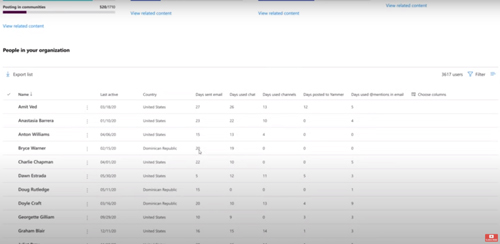News
Microsoft Pulls Productivity Score Feature After Privacy Concerns
- By Kurt Mackie
- December 01, 2020
The ability to show user names in the Microsoft 365 Productivity Score product, which became available just last month, has been removed by Microsoft in response to concerns that it may be used by organizations to snoop on employees.
Productivity Score is a Microsoft 365 product that shows stats on the use of Microsoft's software. It's billed as a tool "to help IT administrators measure and manage adoption so their people can get the most out of Microsoft 365," according to the Tuesday announcement by Jared Spataro, corporate vice president for Microsoft 365.
Spataro also noted that Microsoft is changing the user interface of Productivity Score "to make it clearer that Productivity Score is a measure of organizational adoption of technology -- and not individual user behavior."
Microsoft is making those two changes in reaction to feedback it got "last week," he explained, and to "bolster privacy for customers." Possibly, that's a reference to recent press accounts implying that Productivity Score is an employer tool for spying on the activities of employees, many of whom may be working remotely.
Productivity Score did have the ability to show user names. Only people with certain Microsoft 365 roles had access, though, such as Global Admins. However, people assigned Reports Reader roles, possibly management personnel, also could see the names. Permissions and roles aspects are described in this Microsoft document.
Microsoft actually demonstrated how the names and activities of employees could be surfaced using Productivity Score in an Oct. 29-dated Microsoft Mechanics video (at around 4 minutes, 18 seconds in), which likely will get modified. Here's a screenshot from that video showing employee stats, such as their number of days reading e-mails, chatting and using @mentions over a 28-day period:
 [Click on image for larger view.] Screenshot from Microsoft Mechanics video showing Productivity Score's ability to identify employee use of Microsoft 365 software.
[Click on image for larger view.] Screenshot from Microsoft Mechanics video showing Productivity Score's ability to identify employee use of Microsoft 365 software.
Productivity Score pulls user data from "Exchange, SharePoint, OneDrive, Teams, Word, Excel, PowerPoint, OneNote, Outlook, Yammer and Skype," according to this overview document. Score points get allocated based on categories such "Communication," "Meetings," "Content" and "Teamwork." These points get charted into an overall score, and it's possible to compare that score with the scores of similar organizations, which apparently go unnamed.
IT departments may be interested in such information, especially when planning the licensing of Microsoft's software, but the info would seem to be of greater value to Microsoft itself, for its product planning purposes. The notion of putting this information into IT hands apparently is that IT can identify areas where they may need to increase software training for the companies that do that sort of thing.
About the Author
Kurt Mackie is senior news producer for 1105 Media's Converge360 group.